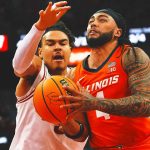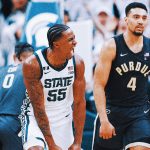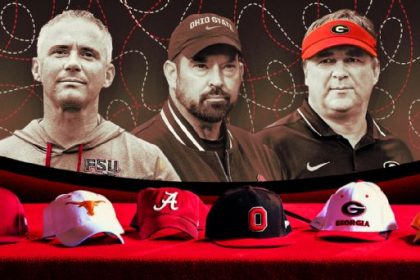Editor’s note: This story was written prior to the Birmingham Stallions’ 28-12 victory over the Pittsburgh Maulers in the USFL Championship Game on Saturday, the Stallions’ second straight championship. You can read all about that game, here.
Following the Birmingham Stallions’ dominant 47-22 win against the New Orleans Breakers in the South Division Championship Game on Sunday, Stallions coach Skip Holtz fielded a question from a media member that he’s grown used to answering.
“Despite all the roster turnover that you’ve seen this season, with injuries and absences keeping key people out of the lineup, how do you, as a coach and your staff, just keep the ball rolling, no matter who’s in the lineup?” Holtz was asked.
It was a perfectly reasonable question. The Stallions have won despite enduring a host of injuries. The best example of that is quarterback Alex McGough, who was not the Week 1 starter but turned out to be the league’s presumptive MVP after an injury forced quarterback J’Mar Smith to miss the season.
ADVERTISEMENT
“There’s a couple pieces to that puzzle that make that work,” Holtz responded. “It starts with Zach Potter, who is our personnel guy. He goes and finds them and coordinates the steps involved in evaluating them and bringing them in here.”
Put another way: Zach Potter is the best-kept secret in pro football.
Potter became general manager of the Stallions at the age of 21. At 22, he’ll have a chance to be a two-time champion. He’s a huge reason Holtz’s team has gone 20-3 over the last two seasons, a huge reason the Stallions will play the Pittsburgh Maulers for a second consecutive USFL title on Saturday (8 p.m. ET on NBC), a huge reason Birmingham has a chance to become the first dynasty of the modern USFL era.
*** *** ***
I first spoke to Potter at 7:30 p.m. on Tuesday, just a few days before the Stallions were to take on the Maulers in Canton, Ohio for the championship. He’d just finished work for the day at the office but wasn’t looking ahead to Saturday. Instead, he was already planning how to make the Stallions an even better team in 2024.
He’s proven adept at planning for such things, possessing a skill not only for identifying talent but for convincing that talent to join the Stallions.
When sifting through the player pool for the 2022 USFL Draft, Potter identified one of the most decorated defensive players in the history of college football, linebacker Scooby Wright, and drafted him. When former Alabama national champion running back Bo Scarbrough became available in the middle of the 2022 season, Potter signed him.
Early in 2023, when it seemed Scarbrough couldn’t play, Potter again had players ready to step in and help, in former South Carolina running back Zaquandre White and former North Carolina State running back Ricky Person.
When the Stallions lost wideouts Victor Bolden to the NFL and later Myron Mitchell to injury, Potter had already identified Deon Cain and Davion Davis as two men who could help. Cain, a former Clemson Tiger, returned two kickoffs for touchdowns in 2023, and Davis has become the Stallions’ best deep threat with 39 catches for 575 yards with four TDs.
When the Stallions lost tight end Sage Surratt — one of the league’s most prolific receivers regardless of position — to New Orleans, Potter identified and signed former Texas A&M All-American Jace Sternberger, former Arkansas tight end La’Michael Pettway and former LSU national champion tight end Thad Moss.
When the Stallions lost the services of their defensive talisman, Wright, following Week 4, Potter had already picked out former Ohio linebacker Quentin Poling as a player who could help them. In Week 9, Poling notched 11 tackles — including two for losses — an interception and a pass defended to secure USFL Defensive Player of the Week. None of these moves have been easy to pull off.
In the USFL, free agency is competitive because teams are not only competing against each other, but against teams in the CFL and XFL. Knowing the rules for acquisition and being willing to recruit like a Power 5 recruiting coordinator are skills in which Potter excels.
“In our free agency process, truthfully, it’s really going to be the first one to find them,” Potter said. “And that’s where I’ve jumped a little faster than most.”
In the USFL, if a player finished training camp with a franchise in 2023, the right of first refusal belongs to that team. Each franchise also has territorial rights for colleges in and around their states. However, in either case, a player who finished playing college football in 2019 or prior is a free agent that any franchise can sign.
“Well, knowing that all my guys are my rights no matter what, I went out and watched all the 2019 and older guys, first and foremost, with the idea of if they get cut, I’m going to call him first, because they’re going to worry about so many other people. And I’m just going to worry about taking the best talent from their territory.”
Davis was an All-American at Sam Houston State, who finished college in 2018. Sternberger finished in 2018. Moss finished in 2019. Cain won a national title with Clemson and finished in 2018. Wright finished in 2015. Defensive tackle Willie Yarbary, a captain at Wake Forest, finished in 2018. Nearly all the aforementioned players are difference-makers for the Stallions, and men Potter identified and then convinced to sign.
Of course, Potter didn’t get ‘em all. Receiver Isiah Hennie reached out to Potter via text, but Potter wasn’t fast enough on the wideout who has drawn favorable comparisons to 2022 USFL MVP and Dallas Cowboys Pro Bowler KaVontae Turpin. Hennie joined the Maulers and will attempt to beat Potter’s team on Saturday.
“It happens,” Potter said. “Still haunts me.”
It doesn’t happen often, though, which is why Holtz has used much of his postgame press conferences to heap praise on Potter and the work he does. And Potter has been doing that work for years.
*** *** ***
Growing up in Council Bluffs, Iowa, Potter wanted to play quarterback. Even in middle school, when it was becoming clear that other boys were growing faster than him, he believed he might receive a late growth spurt. Maybe he could stretch to 5-foot-9 and develop the playmaking ability and accuracy of Russell Wilson. Maybe he could be a leader, the guy who could will his team to victory.
“I wanted to be somebody that everybody could count on,” Potter said. “I wanted the ball in my hands. I wanted to help win football games.”
In sixth grade and standing a mere 5 feet tall, Potter went out for his middle school team but was stopped short by his physical education teacher before he could even begin a sprint.
“The PE teacher told me I wasn’t big enough to try out, which is unbelievable for sixth-grade football, but that’s kind of how it was,” he said.
At 11 years old, his dream had seemingly been dashed before it could even get started. But Potter made the pivot so many do when the game becomes too big, too strong, too fast, for their bodies to keep up: He decided right then that he was going to become a coach. But he didn’t have experience — any experience — playing the sport either.
“I kind of quickly realized that coaching is really going to favor the guys that have played it the most,” Potter said. “So I thought, well, I’m gonna watch a ton of film and see if I can’t study these athletes and what makes them so great. I always thought that maybe I could put a team together. Maybe I could find a way to assemble a team of talent that could win something great.”
Sure, you can watch “film.” But it’s damn hard for folks outside of football offices to get their eyes on professionally-cut coaches tapes.

Zach Potter (far left), with fellow USFL GMs (from left) Bobby Moore, Steve Kazor and Mike Woods. Photo courtesy of Zach Potter.
The best most folks can hope for is clips, sometimes whole games, on YouTube and Hudl, the latter being a service where high school recruits upload their personal highlight film for evaluators to watch on mute while picking out who gets a scholarship offer and who does not.
And that is exactly what Potter did.
“I’m using Twitter. I’m using Hudl. I’m using anything and everything to identify — YouTube, mainly all highlight tapes. I knew that I wanted the ability to identify talent. And I wanted the ability to identify people and characters.”
When he was not watching highlights, he was studying great players, coaches and evaluators.
“I always tell Coach Holtz that I’m a football fan, first and foremost,” Potter said, “but I learned everything that I know from the NBA in terms of the ability to scout athletes, team-building philosophy, characters and divas, people coming together. What Steve Kerr did with the (Golden State) Warriors and their dynasty and how you had to limit ego, how you had to go out and get the best talent to assemble, ultimately, the best team. Almost every coach is always going to believe that it’s their scheme that is really important, which it really is.
“But if you can assemble the right guys and the great group of talent, then you can truly have something special, obviously, as long as you have a great coach in place, which, we have one on one in terms of a head coach and the quality that he’s able to bring to these young men.”
Holtz has echoed those sentiments when talking about why he believes his team has been so good.
“It’s inspirational,” Holtz said. “I think a lot of guys come in here and say we don’t bring guys in here for us to become them. We bring them in here for them to become part of us. And I think we’ve got great character and great leadership in that locker room, and those guys have done an unbelievable job of putting their arms around some new players that have come in and made huge impacts for us so far, just this season. That’s what makes this team so much fun, and that’s why I truly believe that we’re on a quest, we’re on a journey. We certainly have some things that we still have yet to accomplish.”
So does Potter. He has no time to waste because he hasn’t had the benefit of time. The challenges we meet in life have a way of speeding us up.
*** *** ***
Potter moved out of his parents’ home when he was just 16 years old. Financially, he was on his own. His school principal at Abraham Lincoln High in Council Bluffs, Iowa — a school of just over 1,300 students — knew Potter was living couch-to-couch.
With that knowledge, he made the special dispensation to secure financial aid for Potter to attend Iowa Western Community College down the road, which ended up being where he would begin his formal education in football. Potter earned his associate degree and his high school diploma in the same year.
When he first arrived at Iowa Western, he immediately sought out the football program. After all, Scott Strohmeier’s IWCC Retrievers are a program that won championships in 2012, 2022 and was runner-up in 2021. The Retrievers produced the aforementioned ZaQuandre White, Oklahoma defensive tackle Perrion Winfrey and at least two All-Americans in each of the last 13 years.
I called Coach Strohmeier and left a voicemail. He called me back within next three minutes.
“You said you wanted to talk about Zach?” he asked. “I love the kid. He’s a great kid. He’s gonna be successful. And I wouldn’t be surprised if you see him in the NFL sometime soon.”
He nearly did. Potter interviewed for an entry-level position with the Minnesota Vikings but was turned down for being overqualified. Potter was miffed. How can you be overqualified to work in the NFL?
The way the Vikings saw it, he’d be giving up a gig where he had great autonomy and authority to do grunt work for the Vikings at a significant pay cut.
“Why would you want to leave what you’re doing to come do this?” the Vikings interviewer asked.
“It’s the NFL,” Potter said. “Why wouldn’t I?”
He didn’t get the job.
*** *** ***
Potter was a small and scrawny high school junior when Strohmeier first saw him. But he was smart and passionate, and he was willing to do anything for the Retrievers. So he put him on a video camera and asked him to film practice.
That made it easy for Potter to have an excuse to watch film, not just with Strohmeier, but with every position coach at IWCC. There, he learned the fundamentals of professional film study, including not only how to identify great players, but great players that his coaches saw as a fit.
“I told Zach the biggest thing I’m gonna tell you is every coach is looking for something different,” Strohmeier said. “So just because Iowa Western likes them doesn’t mean the next coach is going to like them. So your job is to figure out what that coach likes. Watch as much film as possible with the coaches in your organization that you’re at and get a feel for what they look for.
“I could send an O-lineman to two different O-line coaches, and one guy could say, No, he doesn’t bend good enough. The other guy could be like, I don’t really care how much he bends, he’s finished his blocks. So I told Zach you have to find out what your guy, your coach, is looking for.”
Potter became Strohmeier’s best video coordinator, one he did not want to see leave after two years because he became so dependable in his evaluation of players. Potter knew what Strohmeier and his staff were looking for. That trait has become Potter’s best attribute as a personnel evaluator — so much so that Strohmeier managed to rehire Potter for one season as a recruiter.
“I couldn’t afford to pay him enough, but he was always going to be valued and wanted because he’s that good,” Strohmeier said. “And he doesn’t care about working late. He is non-stop. And when I say non-stop I mean non-stop.
“We’re sitting in a day and age where we can’t find employment anywhere,” Strohmeier said. “Like nobody wants to work here or work there — that kind of stuff. But if I told Zach, ‘Hey, I got this job for you, but it’s a 5 a.m.-to-10 p.m. job. And this grunt work is what you do. He won’t flinch. Hours don’t scare him. And that’s not typical today.”
After earning his associate degree, Potter enrolled at the University of Nebraska in 2020, working for Matt Lubick on Scott Frost’s staff. There, he learned about The Spring League, hooked up with former USFL President Brian Woods and was exactly the kind of general manager Holtz wanted when he became the Stallions head coach.
“I wanted a young guy or somebody who works well with a short staff,” Holtz said. “I need somebody that wants to work 24/7. Somebody that is hungry enough that they want to be here, but not necessarily for long in terms of how hard they’re willing to work.”
“He didn’t want to make this seem like a retirement job,” Potter told me. “And he was competitive. He was coming from college football and obviously kind of a chip on his shoulder as well to prove to people that he’s a winner, especially at all levels, especially now.”
Holtz, who had been fired as head coach at Louisiana Tech, hadn’t won a conference championship in college football since 2009 and had never had a chance to coach pro football. He had something to prove, and so did Potter.
“I think we had about a three-and-a-half-hour conversation,” Potter said. “And the phone call eventually ended up that we were on the same page. And we wanted to build a dynasty.”
*** *** ***
Settling on a quarterback was their first and most difficult decision.
Holtz wanted to have J’Mar Smith on his roster because Smith already knew the offense, having played for Holtz at Louisiana Tech.
“The first thing I had to understand was exactly what quarterbacks were going to be in the pool,” Potter said. “And then second was what Coach Holtz was exactly looking for and what we believe it’s going to succeed in spring football. And I remember Coach Holtz being a little frustrated with me at the time because his safety net was always J’Mar Smith, who undoubtedly is still one of the best quarterbacks in our league, and a guy that can orchestrate his offense at a very high level.”
Once it became clear that Smith was going to be a Stallion due to the USFL’s Draft regulations, Potter set about trying to find a quarterback that might give the Stallions an edge on the league.
“Ultimately, we needed to decide on somebody that had a lot of potential,” Potter said. “And at that time, it was going to be a dual-threat quarterback named Alex McGough. What we really saw in him was a young kid that maybe didn’t showcase his emotions best on the football field, truly was gifted from an arm standpoint but also, most importantly, had an NFL-level of ability to create plays that technically were never there for the traditional, ordinary quarterbacks.
“Me being a young evaluator, I was raised to look for those tools that Alex possesses. Coach Holtz, being the old school quarterback coach goes, well, can he execute within the pocket? Is the guy gonna throw on time? Can the guy move the safety with his eyes? And I said, Coach, I don’t know that question. But I do know he is as gifted as any of them.”
Of course, Potter is talking about the MVP of the league, the guy Holtz has called an artist, a painter. But that guy? The one who is as gifted as any of them? Zach Potter is that guy, too.
RJ Young is a national college football writer and analyst for FOX Sports. Follow him on Twitter at @RJ_Young. Subscribe to “The Number One College Football Show” on YouTube. He is not on a StepMill.
USFL trending

Get more from United States Football League Follow your favorites to get information about games, news and more











